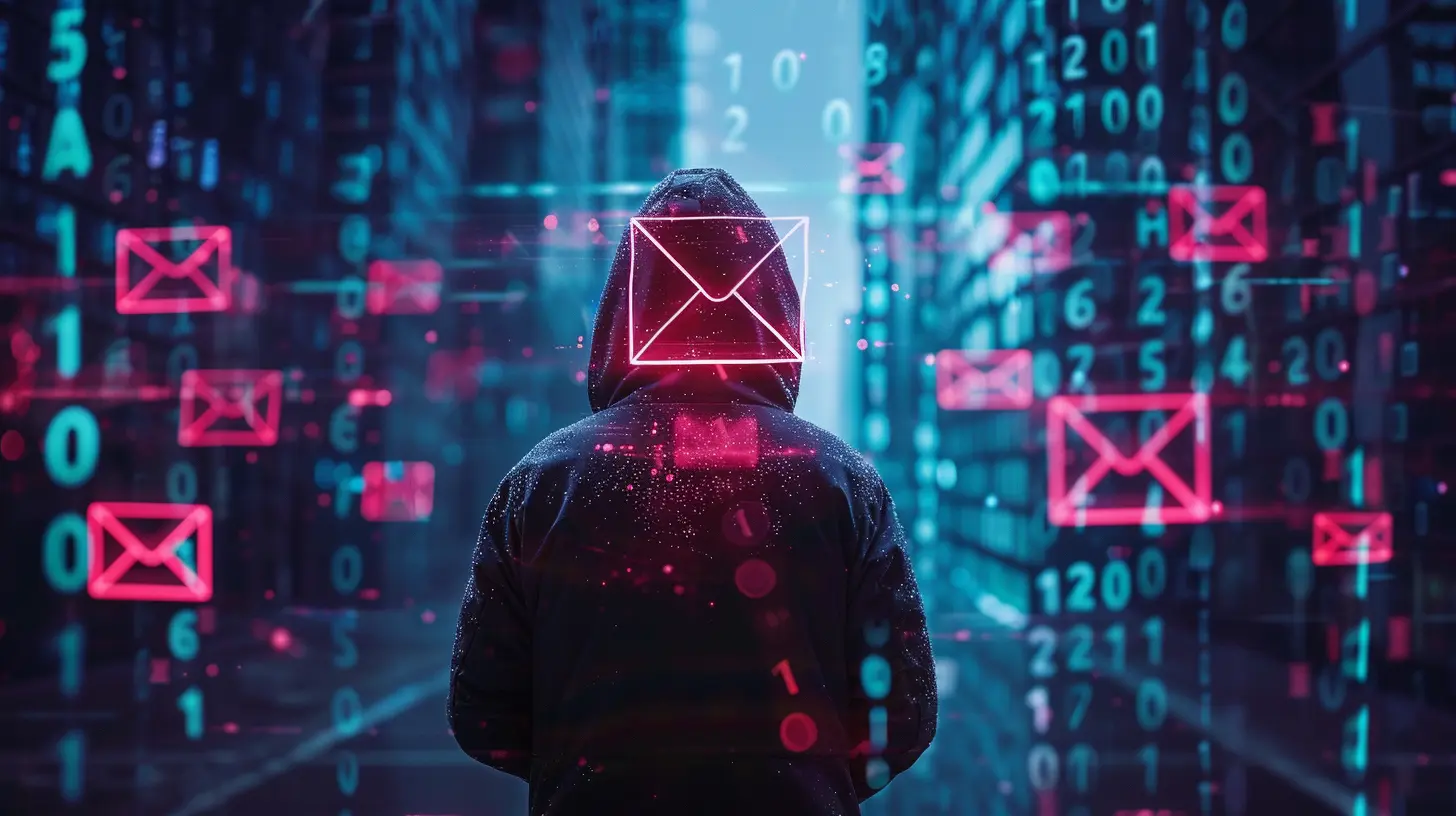Why You Should Care About Your Email Privacy
10 June 2025
Email has become an essential part of our digital lives. Whether it’s for work, personal communication, or signing up for the latest streaming service, we rely on email more than we realize. But here’s the kicker—your email privacy is under constant threat.
From hackers and scammers to corporations tracking your every move, the battle for your inbox security is real. If you’ve ever thought, “I have nothing to hide, why should I care?”—think again. Let’s break it down and see why protecting your email privacy isn’t just important, it’s absolutely crucial. 
The Hidden Dangers of Ignoring Email Privacy
You might not think twice before sharing your email address on a website or using the same password across multiple accounts. But what happens behind the scenes could shock you.1. Hackers Love Easy Targets
Cybercriminals are always on the lookout for weaknesses. Your email is often the gateway to your entire online presence. If it gets hacked, attackers can reset passwords, steal sensitive information, or even commit identity fraud.Think about it—most of your online accounts are linked to your email. Banks, shopping sites, social media, and more. One breach and suddenly, your entire digital life is up for grabs.
2. Phishing Attacks Are Getting Smarter
Ever received an email that looked almost legit? Maybe it claimed to be from your bank, asking you to “verify” your account? That’s phishing—an attempt to trick you into giving away your personal details.Scammers have gotten better at designing emails that look authentic. They use urgency, fake logos, and even real-looking email addresses to lure you in. Clicking a single malicious link can lead to financial loss, identity theft, or malware infections.
3. Corporations Are Tracking You
Big tech companies thrive on data. When you sign up for a "free" service with your email, you're often paying with your privacy. Advertisers track your online behavior to create targeted ads, analyze your habits, and sell that data to third parties.Ever noticed how you search for something once and suddenly see ads for it everywhere? That’s data tracking in action, and your email activity plays a huge role in it.
4. Spam Overload Is More Than Just Annoying
Spam emails aren’t just a nuisance clogging up your inbox—they can be dangerous. Some contain malicious attachments, while others try to trick you into giving away personal information. Without proper email privacy measures, your email address can end up on spam lists, exposing you to unnecessary risks.
How Your Email Privacy Is Being Compromised
Wondering how your email privacy is getting violated without you realizing it? Let’s look at some common ways:Publicly Available Email Addresses
Ever posted your email on a public forum or social media? Bots and scammers scrape the internet for exposed email addresses, making you an easy target for spam and phishing attempts.Weak or Reused Passwords
If you’re using the same password across multiple accounts, you’re playing a dangerous game. A single data breach on one site can expose your login credentials, making all your accounts vulnerable.Leaked Data from Breaches
Unfortunately, companies get hacked all the time. If a service you signed up for gets breached, your email and personal details might end up on the dark web, ready to be exploited.Clicking on Suspicious Links
Clicking on an email link without verifying its authenticity can install malware or take you to a fake website designed to steal your login credentials.
Steps to Protect Your Email Privacy
Now that we’ve covered the risks, it’s time for the good news: You can take control of your email privacy. Here’s how:1. Use Strong, Unique Passwords
A strong password is your first defense against intrusions. Use a combination of letters, numbers, and symbols. Better yet, use a password manager to generate and store passwords securely.2. Enable Two-Factor Authentication (2FA)
2FA acts as an extra layer of protection. Even if someone gets your password, they’ll need a verification code from your phone to access your account. It’s a simple step that makes hacking exponentially harder.3. Be Wary of Phishing Emails
If an email asks for sensitive information, be skeptical. Look for red flags like spelling mistakes, generic greetings (e.g., "Dear Customer"), urgent threats, or unexpected attachments.4. Use an Alternative Email for Sign-ups
Consider using a separate email for newsletters, promotions, and online registrations. This keeps your primary email reserved for personal and important communications.5. Encrypt Your Emails
Encryption ensures that only the intended recipient can read your email. Services like ProtonMail and Tutanota offer built-in encryption for better security.6. Check for Data Breaches
Regularly check if your email has been involved in data breaches using websites like Have I Been Pwned. If compromised, change your passwords immediately.7. Limit Email Tracking
Many marketing emails contain tracking pixels that record when you open them and your location. Use email clients that block tracking or browser extensions that prevent your activity from being monitored.8. Unsubscribe from Unwanted Emails
Tired of endless promotional emails? Unsubscribing reduces spam and minimizes your exposure to phishing risks. Just make sure you're unsubscribing from legitimate sources and not clicking on fraudulent links.
The Future of Email Privacy
Email security is evolving, but threats are evolving too. With AI-powered phishing attacks and sophisticated tracking methods, staying informed is crucial.Governments worldwide are implementing stricter data protection laws, but the responsibility still falls on individuals to safeguard their digital footprint. Privacy-focused email services, better cybersecurity tools, and increased public awareness will play a vital role in shaping a safer future for our inboxes.
Final Thoughts
In today’s digital age, email privacy isn’t a luxury—it’s a necessity. Protecting your inbox means safeguarding your personal identity, financial security, and sensitive data.Take proactive steps today because once your email privacy is compromised, undoing the damage can be a nightmare. A few simple changes in your habits can make a world of difference in keeping your online identity safe.
So, ask yourself—are you doing enough to protect your email privacy? If not, there's no better time to start than right now.
all images in this post were generated using AI tools
Category:
Data PrivacyAuthor:

Adeline Taylor
Discussion
rate this article
3 comments
Maya Wheeler
Email privacy is often overlooked, yet it's crucial for safeguarding personal data. With increasing cyber threats and surveillance, understanding and prioritizing your email security is essential for protecting your digital identity.
June 22, 2025 at 12:22 PM

Adeline Taylor
Absolutely! Email privacy is vital in today's digital landscape, as it directly impacts our personal data security and digital identity.
Greyson Griffin
Email privacy is crucial in an age where personal data is frequently exploited. Unauthorized access can lead to identity theft, financial loss, and breaches of sensitive information. By prioritizing email security and privacy, individuals can better protect themselves from potential cyber threats and intrusions.
June 16, 2025 at 12:48 PM

Adeline Taylor
Absolutely! Email privacy is essential to safeguard against identity theft and financial loss. Prioritizing security helps protect your sensitive information in today's digital landscape.
Gabriella Torres
Email privacy is often underestimated, yet it's crucial in safeguarding personal data against breaches and surveillance. With increasing cyber threats, understanding how your information is handled can empower you to take proactive measures, ensuring your communications remain confidential and secure.
June 14, 2025 at 12:47 PM

Adeline Taylor
Thank you for highlighting this important issue! Email privacy is indeed vital for protecting personal information in today's digital landscape.



